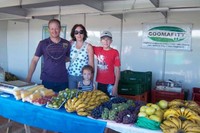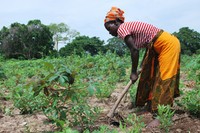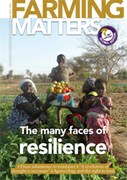Cultivating resilience is a practice that we see arising in many corners of the world. A seed is sown, it is watered and tended, and a stronger farming system emerges. Here, from four different continents, we see diverse examples of such development and how they are helping family farmers.
Brazil: Alliances for agroecological transition

The Cooperative of Itati, Terra de Areia and Três Forquilhas (COOMAFITT) for example, helps family farmers market their products especially through these procurement programmes. Together with NGOs, a local women’s association and a participative guarantee system for certification, they also work to upscale agroecology through local markets and ecologically-based production techniques.
Eliane, one of the farmers, says, “Now I can diversify my production and have vegetables for my children. Agroecological practices make more sense to me. We used to grow only beans and sell them at a very low price to middlemen.” This freedom of choice has become possible by marketing products through farmers markets and cooperatives. Farmers are now receiving fair prices that reflect the quality of their produce, are enjoying higher incomes, and are living proof that local sustainable food systems are possible.
For more information contact Maria Alice Mendonça at the Programa de Pós-Graduação em Desenvolvimento Rural (UFRGS), or Monique Medeiros at Programa de Pós-Graduação em Agroecossistemas (UFSC).
Email: maria.alice.fcm@gmail.com or mmedeiros@ymail.com
Romania: Sharing free seeds
Saving, multiplying and distributing seed are key activities of Eco Ruralis, a peasant association in Romania. Varieties of tomatoes, peppers, squash and other crops are displayed in a colourful catalogue of free seeds, and in 2014, more than 800 envelopes containing up to five varieties of seeds each were sent out. The association also grew by several hundred members.
One of the poorest countries in Europe, Romania has almost five million peasant farmers, a quarter of the population. But national and European policy is driving many farms out of existence. Those in Eco Ruralis say: “Peasants in Eastern Europe feel threatened by new European seed law proposals because they are not able to go through all the necessary bureaucracy and to pay for the required private safety testing. We need regulations that work for the people, not the industry.”
Hundreds of thousands of peasants already serve as migrant farm workers in Western Europe, while others, old and discouraged, stay only to face the speculative influence of large multinational investors. Seeds have become the interface of a rapidly developing agroecology movement in Romania, a country drifting towards dependence on agroindustries. Eco Ruralis remains determined to keep seeds free and available for peasant farmers.
For more information, contact Ramona Duminicioiu.
Email: ecoruralis@gmail.com
Mozambique: Building adaptive capacity

To facilitate farmers’ adaptability to these challenges, CARE International has established Farmer Field Schools in the northern Mozambican Province, Nampula through its Adaptation Learning Programme for Africa. The story of Muahera Antonio, a 32 year old mother of seven, reflects how this approach has improved food security and household resilience. Muahera’s livelihood is based on the crops she grows, but declining rainfall in recent years has meant that her yields have also fallen drastically.
In the Farmer Field School, Muahera and fellow community members learn about sustainable farming practices like minimum tillage, permanent soil cover using green manures/cover crops. As a result of applying the techniques she has learned, the fertility and water retention capacity of her soil has improved, enabling Muahera to increase her harvests. She declares that she is better prepared to face climate change now. “I am still eager to learn more and I will keep working hard to continue increasing yields to sustain my family”, she says.
For more information contact Margarida Simbine at CARE International, Mozambique.
Email: msimbine@care.org.mz or alp@careclimatechange.org, or visit www.careclimatechange.org/adaptation-initiatives/alp
India: Local seed systems for enhancing food security and farm resilience

In 2011, the DHAN Foundation started the ‘Revalorising small millets in rainfed regions of South Asia’ (RESMISA) project which significantly enhanced diversity of small millet varieties in each project site after three years. This was achieved by strengthening local seed systems and bringing together various varietal improvement efforts used on four species of small millet.
The guiding methodology was farmer-led research, building on indigenous knowledge systems and complemented by gender sensitive scientific and participatory methods. The experience proved the value of traditional varieties so often ignored by formal seed systems. However, varietal improvement must be a continuous process of integrating small millet into community seed systems if it is to carry on meeting the evolving needs of farmers.|
For more information contact M Karthikeyan, Principal Investigator for the RESMISA project and Programme Leader for Rainfed Farming Development Program, DHAN Foundation, or CSP Patil, University of Agricultural Sciences, Bangalore.
Email: karthikeyan@dhan.org
This is a summary of an article that appeared in LEISA India 16.1, March 2014.

